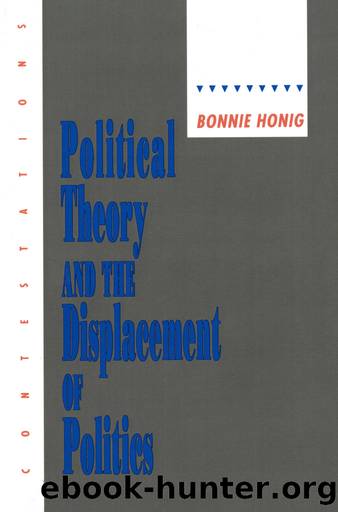Political Theory and the Displacement of Politics by Bonnie Honig

Author:Bonnie Honig [Honig, Bonnie]
Language: eng
Format: epub
Tags: Politics
ISBN: 9780801480720
Google: xLV_DQAAQBAJ
Goodreads: 2156564
Publisher: Cornell University Press
Published: 1993-01-15T12:25:59+00:00
The Practice of Punishment
In The Genealogy of Morals, Nietzsche envisions a society so powerful that it does not need to punish: âA society might attain such a consciousness of power that it could allow itself the noblest luxury possible to itâletting those who harm it go unpunished. âWhat are my parasites to me?â it might say. âMay they live and prosper: I am strong enough for thatââ Nietzscheâs imagined society does without punishment not because its laws are ârightâ or because its citizens become increasingly obedient but because it overcomes justice (the insistence on right) with mercy, a kind of magnanimity that is âbeyond the law.â43 The scenario is not merely naive. That it initially strikes the reader that way is one of the most telling points of the reflection. The image of a society so powerful that it does not need to punish is meant not to make us yearn unrealistically for the realization of the ideal, but to invite us to reflect critically on why and how societies punish, to think about punishment (its gravity, its sites, and its frequency) as a measure of societal need rather than individual deviance, as a signal of social weakness rather than administrative resolve.
In A Theory of Justice, Rawls also envisions a society that does not need to punish.44 But if Rawlsâ ideal society does without punishment, that is not because it is powerful enough to afford magnanimity but because its institutionalization of justice makes magnanimity unnecessary: criminality does not surface in a well-ordered regime. Rawls wagers that citizens governed by relatively just institutions will acquire a âcorresponding sense of justice.â45 Well-ordered institutions engender well-ordered selves, and this secures the regimeâs stability.46 Gradually, the citizensâ felt need to reenter the original position disappears. The disruptions of dissonance and resistance, both inter- and intrasubjective, diminish.
Hence Rawlsâs wager that his scheme will pass the formal tests of stability and congruence. The âstrains of commitmentâ will not be too burdensome in justice as fairness, and the institutional order will be congruent with the membersâ conceptions of the good.47 But the wager is premised on the assumption that the institutions of justice as fairness fit and express the (core) self without remainder. As Rawls puts it, the original position, by bracketing the contingent attributes and worldly features that set people at odds, and the difference principle, by refusing to distribute scarce resources as moral rewards for contingently distributed natural talents, give âexpression [to] our nature as free and equal rational beings.â48 This expressivism is what underlies Rawlsâs belief that justice as fairness does not ask too much of its subjects.
But Rawlsâs expressivist ground is insecure. His identification of a human (moral) nature with a free and equal rationality soon gives way to the admission that some beings are free and equally rational but others are oddly irrational, even immoral, even when raised in a just regime. His identification of the core of the self with freedom and reason is soon tempered by the admission that there are some selves whose core constitution is anything but rational.
Download
This site does not store any files on its server. We only index and link to content provided by other sites. Please contact the content providers to delete copyright contents if any and email us, we'll remove relevant links or contents immediately.
| Anarchism | Communism & Socialism |
| Conservatism & Liberalism | Democracy |
| Fascism | Libertarianism |
| Nationalism | Radicalism |
| Utopian |
The Secret History by Donna Tartt(19086)
The Social Justice Warrior Handbook by Lisa De Pasquale(12190)
Thirteen Reasons Why by Jay Asher(8909)
This Is How You Lose Her by Junot Diaz(6886)
Weapons of Math Destruction by Cathy O'Neil(6279)
Zero to One by Peter Thiel(5801)
Beartown by Fredrik Backman(5754)
The Myth of the Strong Leader by Archie Brown(5507)
The Fire Next Time by James Baldwin(5442)
How Democracies Die by Steven Levitsky & Daniel Ziblatt(5218)
Promise Me, Dad by Joe Biden(5153)
Stone's Rules by Roger Stone(5087)
A Higher Loyalty: Truth, Lies, and Leadership by James Comey(4962)
100 Deadly Skills by Clint Emerson(4925)
Rise and Kill First by Ronen Bergman(4788)
Secrecy World by Jake Bernstein(4753)
The David Icke Guide to the Global Conspiracy (and how to end it) by David Icke(4717)
The Farm by Tom Rob Smith(4507)
The Doomsday Machine by Daniel Ellsberg(4490)
